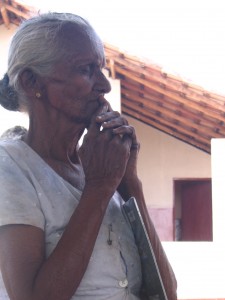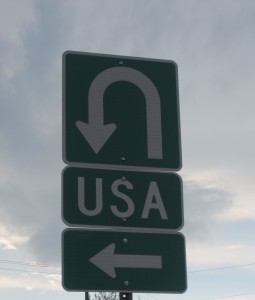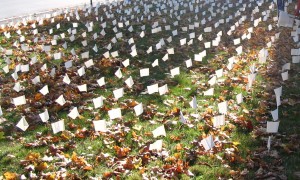Whose Wars are These?
 The wars that permeated my childhood were those that were internal to my country, Sri Lanka. Therefore everybody was involved. There was no refuge from it, no matter your social status, particularly if you were male. You could be killed going to market, you could be abducted from your dorm-room, you could be left to burn with a tyre around your head, you could be shot, you could die with dozens of others in a suicide attack. Everybody knew where everybody else stood, where their sympathies lay, what hue colored their politics. More than that, everbody knew someone who had died and most of us knew more than a few. We did not have a particular love for living in a state of war, far from it. But they were the circumstances of our history for nearly three decades, and we lived or died along with the fortunes of our country.
The wars that permeated my childhood were those that were internal to my country, Sri Lanka. Therefore everybody was involved. There was no refuge from it, no matter your social status, particularly if you were male. You could be killed going to market, you could be abducted from your dorm-room, you could be left to burn with a tyre around your head, you could be shot, you could die with dozens of others in a suicide attack. Everybody knew where everybody else stood, where their sympathies lay, what hue colored their politics. More than that, everbody knew someone who had died and most of us knew more than a few. We did not have a particular love for living in a state of war, far from it. But they were the circumstances of our history for nearly three decades, and we lived or died along with the fortunes of our country.
I would like to believe that the fact that America’s wars have been waged overseas is the reason why this kind of intimacy with mayhem and loss does not pervade every home here. I would like to imagine that it is universally mystifying to Americans that America could be fighting two major wars and the vast majority of people could go on with their lives knowing not one soul who has been dispatched to kill and die, nor any who returned injured or in a casket. I know only three. The husband of my college room-mate, the son of a Veterinarian in the town I used to live in, and a fellow-writer and photographer whose concerns mirror mine; none of them untouched by their years of service, one of them lost entirely. How strange it must have been for these three young men to return home to people fretting about organic apple cider and home-made iced-tea, about peanut-free classrooms and special activities for those who do not celebrate any one of the national holidays. “Americans and their damn bottles of water,” one of them quipped to me. “What a joke. Like they really imagine they might suddenly die of thirst.”
How strange that when I posted a link to an essay by one of those veterans, Elliott Woods, on Facebook, nobody clicked it. This is what I said in my note:
Just read this piece of reporting by Elliott Woods. Between poppy palaces and narchitecture and 100 minefields still waiting to explode in greater Kabul, between 15,000 troops and upto 1.5 million Afghans killed during the reign of the Soviets and the advent and departure of the Americans is a story that too few of us know. Even those of us who in one way or another contribute to the “donor money” that accounts for four-fifths of the $14 billion GDP in Afghanistan.
I decided to see if it were the case that nobody was paying attention or if nobody cared. I followed up with a joke about Facebook cut and pasted from some online source for a thousand and one jokes. There were the comments I had been missing. Yes, nobody cared. We care about the here, the now, and the herenow does not involve Afghanistan, Iraq, Iran, Pakistan, vast swaths of Africa or most of the rest of the planet and certainly not those who were forced to go there to commit the acts no mother raises her child to perpetrate, and who must then return to our midst, shattered and frayed, this generations particular brand of invisible men.
How strange that Marine Lance Cpl. Scott Olsen went down in a hail of enemy fire aimed at him by American policemen during the  course of a peaceful protest in the streets of Oakland, California. After two tours of duty in Iraq with the 3rd Battalion, 4th Marine Regiment in Iraq’s Anbar province, site of some the war’s fiercest battles, this young man who had been just 14 years old when we experienced the events of 9/11, lay on the streets on Tuesday, the 25th. Why? Because he had divined that much of the economic inequity in America was fuelled by the military industrial complex. That, and the fact that nobody gave a damn where he had been and what he had done or seen, just pass the cocktail shrimp and Muscat.
course of a peaceful protest in the streets of Oakland, California. After two tours of duty in Iraq with the 3rd Battalion, 4th Marine Regiment in Iraq’s Anbar province, site of some the war’s fiercest battles, this young man who had been just 14 years old when we experienced the events of 9/11, lay on the streets on Tuesday, the 25th. Why? Because he had divined that much of the economic inequity in America was fuelled by the military industrial complex. That, and the fact that nobody gave a damn where he had been and what he had done or seen, just pass the cocktail shrimp and Muscat.
According to a report released by the Center for a New American Security, from 2005 to 2010, service members took their own lives at a rate of approximately one every 36 hours. Scroll down on the report and we find the statement that the “VA estimates that 18 veterans take their lives every day,” and then goes on to state that they have no way of knowing the accurate number because of their inability to track the veterans.
Long ago when I used to watch The News Hour on PBS for my one hour of not doing, the segment used to end with a silent screen on which appeared the names of the newly dead Americans. I don’t know that they still do it, I don’t watch anymore, but I do know there is a searchable database on the PBS website which lists the dead, from 1 on the page 1-25 of 4885. That list stopped on August 2010. I no longer know how many people have died. I remember writing about the 2000th soldier, Staff Sgt. George T. Alexander Jr., back in 2005 for the local paper in Waterville, Maine.
Michael Meade, in an interview done by John Malkin which appears in The Sun (November, 2011), speaks, among other things, about the distinction between warriors and soldiers:
“I work with veterans coming back from the wars in Iraq and Afghanistan. I am perosonally against war, but I also understand the sense of exile and the alienation felt by people returning from all the battlefields of life. I’ve been working with veterans for years and watching the struggles of souls trying to find a way home. in a sense they are some of the most exiled people in modern culture. There is a burden of tragedy that they’re carrying for all of us.
…
Mass culture distorts our instincits and inclinations. Some people are natural fighters so they become soldiers. But soldiers are the opposite of warriors: soldiers do what they’re told; warriors do what they feel is best for everybody…A warrior isn’t looking for war. A warrior looks to be of service to something beyond him or herself. What’s happened is that the culture uses that willingess to serve its own narrow ends…When you take the willingness to sacrifice and aim it in the wrong direction for the wrong reasons, you get damage, and not just to the individual. That damage is inherited by future generations. For healing to occur, the truth has to come out, and by ‘truth’ I don’t mean which side was right. That’s the small argument. The truth is that souls were hurt, and healing is required for the individuals as well as the collective.”
That burden of tragedy – of wars waged, of warriors forced into the servitude of soldiering – that burden belongs, surely, to all of us in whose name these things were perpetrated, not just the servicemen coming home to places that are unreconcilable with the places they’ve been in, places filled with people who don’t recognize them and in some ways never saw them to begin with. What is a human being to do, ever, about war? What is an artist to do? What can a writer say? If my words cannot move anybody to see more clearly, listen more closely, of what use are they?
It is the 5th of November. I know why I felt compelled to write about war and veterans today. I write about them because I’m thinking about a beautiful, talented writer who is my friend. I have never met anybody in her family. I know nothing about her brother. She never spoke of him until I emailed her to tell her that I had lost my mother and did not know how I would go on. She told me about him then, about his time in Iraq and the fact that he had, upon his return, unable to reconcile himself to all that he had witnessed and participated in, killed himself. Today marks the seventh anniversary of his passing. I have nothing to offer her or to any other family that has gone through this particular kind of loss, except my attention to the whole of their experience, the whole of their grief.



Your words do more than you know.
Thanks Ru. This is exactly what I want Americans to think about. Exactly. Couldn’t have said it better myself. Thanks.